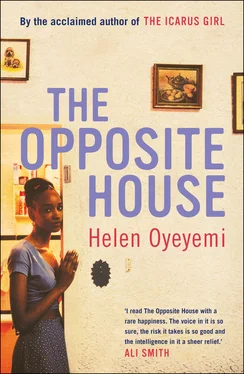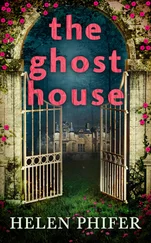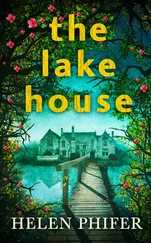Helen Oyeyemi - The Opposite House
Здесь есть возможность читать онлайн «Helen Oyeyemi - The Opposite House» весь текст электронной книги совершенно бесплатно (целиком полную версию без сокращений). В некоторых случаях можно слушать аудио, скачать через торрент в формате fb2 и присутствует краткое содержание. Год выпуска: 2008, Издательство: Bloomsbury UK, Жанр: Современная проза, на английском языке. Описание произведения, (предисловие) а так же отзывы посетителей доступны на портале библиотеки ЛибКат.
- Название:The Opposite House
- Автор:
- Издательство:Bloomsbury UK
- Жанр:
- Год:2008
- ISBN:нет данных
- Рейтинг книги:4 / 5. Голосов: 1
-
Избранное:Добавить в избранное
- Отзывы:
-
Ваша оценка:
- 80
- 1
- 2
- 3
- 4
- 5
The Opposite House: краткое содержание, описание и аннотация
Предлагаем к чтению аннотацию, описание, краткое содержание или предисловие (зависит от того, что написал сам автор книги «The Opposite House»). Если вы не нашли необходимую информацию о книге — напишите в комментариях, мы постараемся отыскать её.
The Opposite House — читать онлайн бесплатно полную книгу (весь текст) целиком
Ниже представлен текст книги, разбитый по страницам. Система сохранения места последней прочитанной страницы, позволяет с удобством читать онлайн бесплатно книгу «The Opposite House», без необходимости каждый раз заново искать на чём Вы остановились. Поставьте закладку, и сможете в любой момент перейти на страницу, на которой закончили чтение.
Интервал:
Закладка:
She puts her head out of the attic window. The branches scrabble to attention, she winces as snow scuttles across her face and eyes.
‘Yeye?’ Mama Proserpine’s call climbs from the kitchen to the rafters.
Aya looks up, sees that she has never understood the somewherehouse’s trees. Their branches brush the ground, yes, their branches fountain in twiggy brackets from earth upwards, but (their roots are buried in the sky) clouds crawl lazily away from the black suction that the roots, wide and thick as doors, drive into the blue. Snow crumbles onto Aya, snow salts her.
All of the watchmaker’s signpost flowers are straining upwards, pointing out what it is that she seeks, up, up. In shattered minutes from window ledge to rough treetrunk, she has fought her way up to the snow’s uneven red centre, a ‘v’ that looks less and less like light and more like blood. Snow unfolds itself in bolts on and around her. Inside her is a happiness that threatens to unzip her and step out singing.
Then her skin finds a limit: other skin, a cheek against her cheek. She tries to climb back down to safety, but, as if she does not own or control her hands, Aya releases the branch. She does not fall, but her tears start immediately. Compunction, for he is terrible.
Him. He leans forward to her; he is the one who has caused the trees to grow contrary, to grow from his heart. He is a great cuspate blade primed to flay her, he is a hammer bringing sun down to gloom.
He says, ‘Daughter.’
‘I cannot.’
‘Cannot —?’
‘I.’
Aya weeps and she looks for herself, but there is no one there.
Papa says, ‘What do you want of me?’
‘I.’
‘You poor child,’ her Papa says.
Her nerve a million times denies her. Papa waits and they breathe together, but Aya cannot speak. Such oppression — it pulls at her eyeballs. He releases her. Aya falls through the tree’s tentacles with her arms spread wide; she is shadowed by falls of snow. . until a new heat lances her and with trembling hands she learns that she is dangling just above her window, her stomach impaled on an ice-whitened branch. Oh, blood.
Mama Proserpine, swimming in place in an ocean of black silk, leans out of the attic window
(too far — she could fall)
to try to help her, and Aya, unable to gesture ‘no’, cannot yet say that this pain brings her ache to the front of her mind. Sleet races leaves down from the tree roots; sleet covers Aya’s shoulders, chills the hot blood she’s losing. The way her limbs are splayed now she is more honest in her agony than she has ever been before. This is what she really looks like, humble before him, her father. This is how he has always seen her.
Kneeling down before three mirrors that Mama Proserpine has fetched and propped up against the attic wall, Aya touches her lips, her forehead, her cheeks; they are daubed with blood from her fingers.
Once, she heard the word ‘welkin’ used, and ‘welkin’ became a word she loved, but did not hear again. Welkin describes old, high fascination. It describes supple colour that catches and jails the eye — blue sky in summer when it spreads itself out like a magic carpet and it seems a person could step up onto it. The welkin tint is caught in Aya’s eyes, is swept over her lips, lights her whole face. Her fingertips wind a dance of shudders down her throat, stroke whorls around her nipples. Drugged with content, her hand slides down to her lap.
‘Where are the Kayodes?’ Aya asks.
Proserpine squeezes another bloodstained rag into her bowl of water, and a green herb smell stretches its fronds over them.
‘They went.’
‘You took them home?’
Proserpine nods and flattens another rag over Aya’s stomach. Aya doesn’t feel it.
‘Are you Mama?’
‘Yeye, don’t do this.’
Aya peels off the hot rag and drops it into the bowl. ‘What happened to your face, your skin? What happened to the way you walk? Why don’t you wear your mask on a mask day?’
Mama settles herself opposite Aya. She sees Aya is uncomfortable and she pulls down her mask, adjusts it. The mask is a white hand that cups Mama’s face.
‘I was weary. So I went to your Papa, and he took my ache.’
This new Mama’s eyes flicker behind her mask.
Aaron wants to tell his mother about my son.
‘I haven’t even told my mother.’
He says, ‘Well, let’s tell her as well. What’s the problem?’
‘No problem, there isn’t a problem.’ I am sarcastic. I do not let him hold my stomach, or even brush against it. Because he performs examinations — that is what he does — when he touches me now his fingers become probes, his fingers tell me he doesn’t trust me. I reject his name suggestions: Gabriel is a stupid name, the other boys would have kicked him to pieces over that name anyway, my son, if he had lived.
I can’t get the sanitary towels out of the house fast enough. So Aaron finds out about the bleeding, about the dark syrup my son sends me. He holds up one of my scented sanitary bags between his fingertips and we both look at the sodden cotton whirling around inside it. For a moment I can see the anger he talked about before. It’s there on his face. Then the flash fades and he is left with a scared face and I am left with a nervous giggle that he doesn’t understand. Aaron wants to know why I didn’t say anything.
Is the baby. . gone?
Have I been to the doctor?
What is the matter with me?
I want to know too, maybe.
Dr Maxwell has big pink cheeks. In her family I bet she is the youngest child, the well-fed child who got morsels from her mother’s fingertips whenever something special was cooking, who had her cheeks pinched into prettiness by tens of doting fingers.
Aaron takes the scare out of the visit to her. The heel of my hand, that part where the veins are most traceable — Aaron kisses me there while she talks about our options. I wade through the ultrasound, through six glasses of water and clear, cartilage-thick gel and the probes, and my son is still there
(or some thing, a small wonderful curl that represents him — he is turned to hide his sex)
and later Dr Maxwell says that my bleeding was just an extra egg, just an extra egg, that sometimes that happens. Throughout the scan Aaron cannot catch his breath for gladness, he cannot see straight for crying — who is he fighting?
I think I am sleeping too much.
My eyes open and I think: daytime . Other times my eyes open and I’m certain it’s night-time. I do not say a lot, because of the leak. If I speak, the leak speaks louder. The water does not want me to be heard. Aaron wants me to know that I am exhausted. But there is no reason for me to be exhausted. I am about to ask him, exhausted from what? but before I can, I am asleep again. It cannot be a good thing to keep falling asleep like this, falling asleep without my choosing or my control. No dreams. But when I manage to fight into waking for long enough, the woman’s song comes back to me so clearly now
(and, yes, she did sing in Habana, she really did — Magalys has lied).
My son is strong, a greater strength of coffee than both Aaron and I. No one will be able to drink right down to the bottom of this boy, if only I let him be born.
Aaron is here again trying to feed me soup, trying to feed me tomato kedgeree, but all I see is bloodied fish. Aaron smiles, he tries to keep me cheerful. I take a long time gathering coherence and then I ask him if he sees anything when he sleeps with his eyes open the way he does. His smile is his answer; it protects him from me and I lose him inside it. I am beginning to understand that at the end of this time there is going to be a need for strength, that as the skin over my stomach pulls tauter my centre descends, and one day I am going to have to push. I don’t know how anyone survives it, the thought or the happening. I will not.
Читать дальшеИнтервал:
Закладка:
Похожие книги на «The Opposite House»
Представляем Вашему вниманию похожие книги на «The Opposite House» списком для выбора. Мы отобрали схожую по названию и смыслу литературу в надежде предоставить читателям больше вариантов отыскать новые, интересные, ещё непрочитанные произведения.
Обсуждение, отзывы о книге «The Opposite House» и просто собственные мнения читателей. Оставьте ваши комментарии, напишите, что Вы думаете о произведении, его смысле или главных героях. Укажите что конкретно понравилось, а что нет, и почему Вы так считаете.












